Have you ever felt a wave of calm when you sip herbal tea? It’s amazing how nature gives us such strong remedies. As we look for new ways to heal, herbal medicine is a treasure trove of natural solutions. It helps us feel better and connects us with the earth.
This article will show you how herbs can heal us. We’ll explore their history and how they can be part of our lives. Learning about these plants empowers us and honors ancient traditions. It reminds us of nature’s wisdom1.
Key Takeaways
- Herbal medicine encompasses natural remedies that have been used for centuries.
- Understanding medicinal herbs allows us to integrate them into our wellness routines effectively.
- Many herbs serve various purposes, from combating anxiety to boosting the immune system.
- Herbal remedies provide a holistic approach to healing that supplements conventional methods.
- Choosing quality herbal products is crucial for safe and effective use.
- Awareness of potential interactions with other medications is essential when using herbal medicine.
- Consulting with trained herbal practitioners can guide us in our journey toward wellness.
Introduction to Herbal Medicine
Herbal medicine uses plants for health. It’s becoming more popular, with the market value nearing US $62 billion a year2. People like it because it’s a natural way to stay healthy, with 40% of adults in the US trying it2. You can find herbal remedies in many forms, like pills, powders, and teas, making them easy to use3.
In places like rural Africa and Asia, plants are a big part of healthcare for 80% of people2. Herbal medicine helps with everything from colds to serious diseases like diabetes and cancer2. This shows a growing interest in natural healing and connecting with nature for health.
It’s important to use herbal medicine wisely and talk to doctors about it. The FDA sees herbal supplements as food, not drugs, so they’re not tested as strictly as medicines3. Knowing about popular herbs like Echinacea and Ginseng helps us make safe choices and avoid problems3.
The History of Herbal Medicine
Herbal medicine is the oldest form of healthcare, dating back to the dawn of humans. Ancient civilizations used medicinal plants, as seen in Sumerian clay slabs and texts like China’s “Pen T’Sao” from around 2800 BC. The Vedas, ancient Indian holy books, also show the use of plants for healing4.
The Ebers Papyrus, from 1550 BC, lists 800 prescriptions for 700 plant species. This highlights the importance of traditional medicine in ancient times5.
Dioscorides, known as the “father of pharmacognosy,” wrote “De Materia Medica” around 100 AD. It cataloged 657 plant-based drugs, influencing medicine for centuries5. Theophrastus, the “father of botany,” identified over 500 medicinal plants. He stressed the need for careful dosing, as some plants are toxic5.
In the Middle Ages, herbal medicine became even more popular. Apprentices learned from skilled herbalists. But, as synthetic drugs became more common, herbal medicine’s use declined4.
The 18th and 19th centuries saw a comeback for herbal medicine. The discovery of active compounds like alkaloids helped understand how plants heal5. Today, the European and United States Pharmacopoeias recognize the value of plant-based drugs. Germany leads in using plants for medicine rationally5.
Our understanding of herbal medicine’s history helps us see its role in healing today. It shows how plants have been used for health and well-being across the globe.
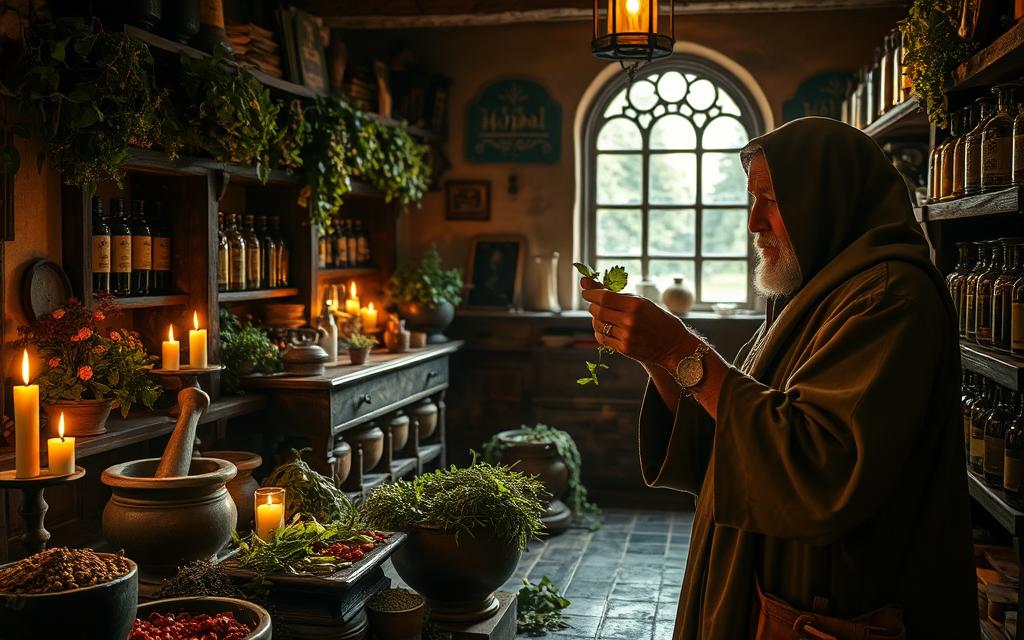
Understanding Medicinal Herbs
Medicinal herbs are powerful allies in our health journey. They have been used for centuries for their healing effects. Understanding their uses can boost our wellness. From teas to tinctures, they offer natural remedies for our health.
What Are Medicinal Herbs?
Medicinal herbs are plants known for their healing properties. They come in forms like teas and capsules. Fresh herbs are used in tinctures and teas, while dried herbs are versatile for powders and capsules6.
These plants help us boost immunity, encourage restful sleep, and enhance alertness. They offer many benefits6.
Common Types of Herbal Remedies
There are many herbal remedies, each with unique properties to improve our health. Some examples include:
- Chamomile: Often used for promoting relaxation and aiding sleep.
- Ginger: Known for its digestive benefits and ability to reduce nausea.
- Echinacea: Frequently used to support the immune system and combat colds.
- Ashwagandha: Famous for reducing stress and balancing energy levels6.
- Lion’s Mane Mushroom: Recognized for its cognitive benefits and potential to enhance mental clarity6.
When exploring herbal remedies, it’s important to choose high-quality products. A 2019 study found almost 50% of herbal products may be contaminated. This shows the need for careful sourcing6.
Always talk to a healthcare provider before using herbal medicine. This ensures safety and effectiveness1. We can use these herbs in our routine while knowing about potential interactions and side effects1.
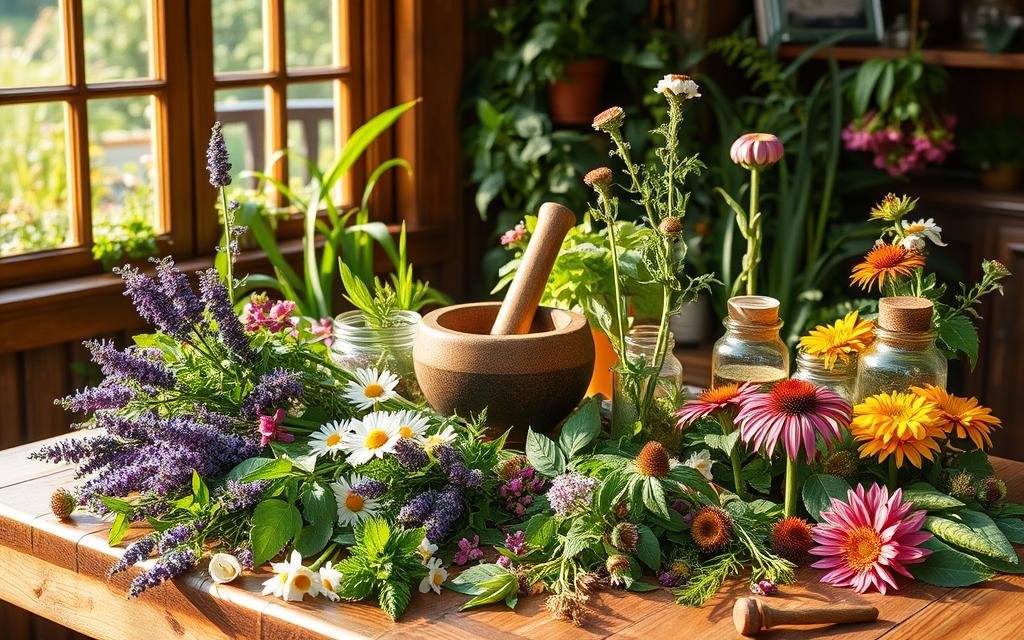
The Science Behind Herbal Medicine
Science is proving that herbal medicine is a key part of holistic healing. For over 5,000 years, herbs have been used to treat many ailments. They are still important today, mainly in developing areas, because they are easy to get and don’t cost much7.
Studies show that herbs contain many compounds called phytochemicals. These compounds make herbs safe and effective7.
The University of Georgia teaches a class on herbs, spices, and medicinal plants. Students learn about identifying plants, herbal chemistry, and making remedies like teas and tinctures8. They also make rosemary-infused olive oil to see how herbs work8.
Noelle Joy, a doctoral candidate, studies how drying herbs affects their quality. She focuses on hemp as a case study8.
Herbal medicine is different from pharmaceuticals because it uses the whole plant. This approach helps us understand the full benefits of herbs7. The World Health Organization says herbal medicine is safe, as long as it’s used without harm. It can help with many health issues7.
Research using AI and fMRI is helping us learn more about traditional medicine. This research shows how well it works and how it works9.
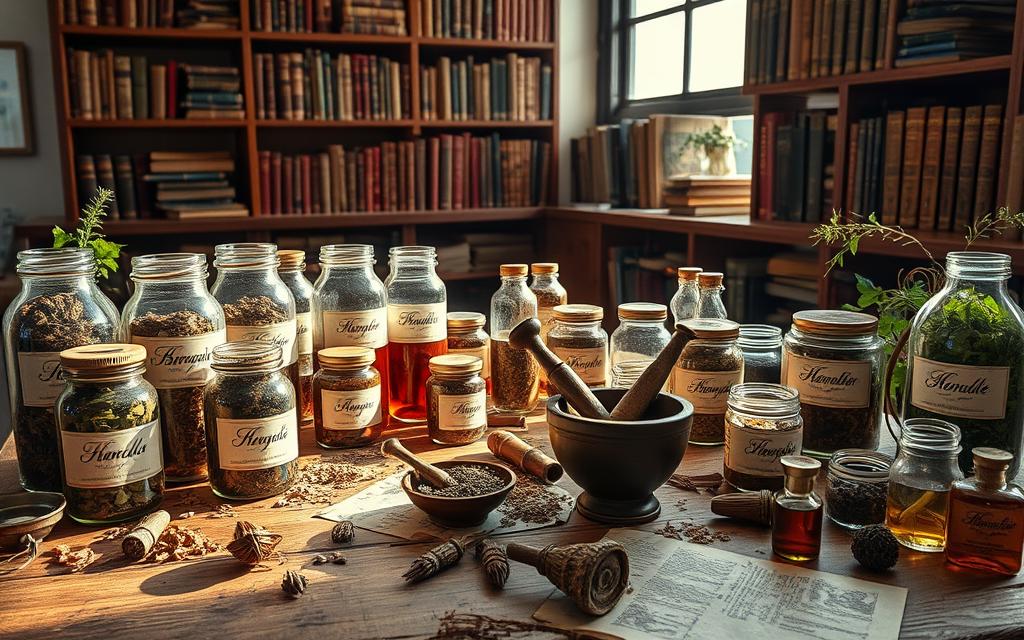
Benefits of Herbal Medicine
Herbal medicine brings many benefits to our health. It helps boost our immunity and relieve stress. People from different cultures, like Africans, Indians, and Chinese, have used herbs for health for a long time.
Boosting Immunity
Herbal medicine is known for its ability to strengthen our immune system. Research shows that herbs can help in over 80% of cases with upper respiratory infections and more10. The natural compounds in herbs can boost our immune system. Traditional practices focus on both physical and mental health, which is key for a strong immune system11.
Stress Relief and Relaxation
Herbal medicine offers great ways to reduce stress. Herbs like chamomile and valerian are known for their calming effects. They help manage stress and have fewer side effects when used correctly11. Herbal treatments aim to balance and relax us, which is vital for our emotional health12.

Herbal Medicine vs. Conventional Medicine
Herbal medicine and conventional medicine show interesting differences that affect our health choices. Herbal medicine looks at the whole person, including emotions and spirit. It’s safer than synthetic drugs, leading to fewer hospital visits13.
Conventional medicine mainly treats symptoms with drugs. Herbal medicine, on the other hand, aims to fix the root cause. It’s known to help with serious diseases like cancer and diabetes13. Yet, it’s important to be careful because some herbs can be harmful or interact badly with other treatments14.
Herbal medicines vary in quality due to factors like plant source and how they’re made. This can affect how well they work. Synthetic drugs, while more consistent, can have serious side effects14.
Adding herbal medicine to our health routine can bring extra benefits. It’s good to know about both to make better choices for our health.
Forms of Herbal Medicine
Herbal medicine comes in many forms. Each form has its own benefits and suits different tastes. Knowing about these options helps us use natural remedies every day.
Tinctures
Tinctures are strong herbal extracts made with alcohol or vinegar. They keep the plant’s active parts, making it easy to get their benefits in small amounts. But, they are very strong, so we must use them carefully. Always talk to a doctor before using them, if we’re on meds or have health issues15.
Herbal Teas
Herbal teas are a soft and tasty way to take herbs. They come in many flavors like chamomile, ginger, and ginseng. Each one has its own health perks. They’re great for starting out with herbal remedies and are easy to add to our daily lives16.
When picking herbal teas, choose ones with good ingredients. This way, we get the most health benefits17.
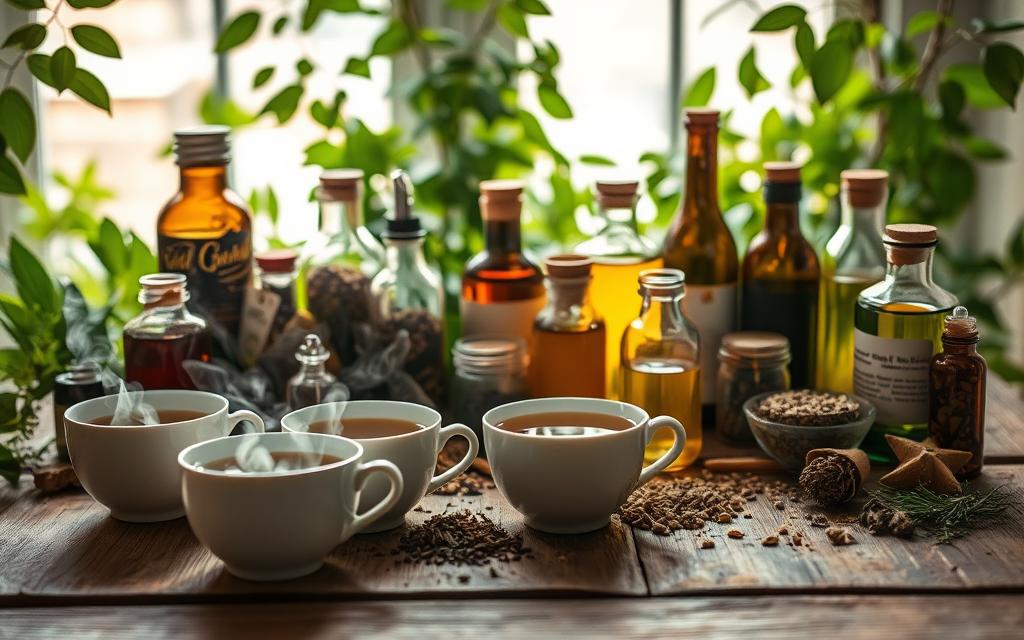
How to Incorporate Herbs into Your Wellness Routine
Adding herbs to our wellness routine can be fun and good for us. It’s important to pick the right herbs for our health needs. We can choose mild herbs for general wellness or specific ones for certain health issues.
Learning how to use herbs in different ways makes it easy to add them to our daily life.
Choosing the Right Herbs
Herbs like Ginkgo biloba can boost brain blood flow and memory. We should take 120-240mg of it daily18. Saw Palmetto helps with prostate health, and St. John’s Wort is good for mood, helping with mild depression18.
It’s key to pick herbs that match our health goals. Always check safe usage guidelines.
Methods of Consumption
We have many ways to use herbal remedies, making it easy to find what works for us. For example, a tea with peppermint and lemon balm can help us relax and sleep better19. A bath with lavender and chamomile can also improve skin health and calm us down19.
We can also use herbal bitters before meals to help digestion. Adding herbs like turmeric and rosemary to our food can boost health19.
| Herb | Benefits | Recommended Use |
|---|---|---|
| Ginkgo biloba | Improves blood flow and supports memory | 120-240mg daily |
| Saw Palmetto | Supports prostate health | 0.6-1.5ml extract or 0.5-1g dried berry daily |
| St. John’s Wort | Supports mood | Use carefully with other medications |
| Peppermint | Aids in digestion | Use topically diluted or in tea |
| Lavender | Promotes relaxation | Use in evening tea or bath |
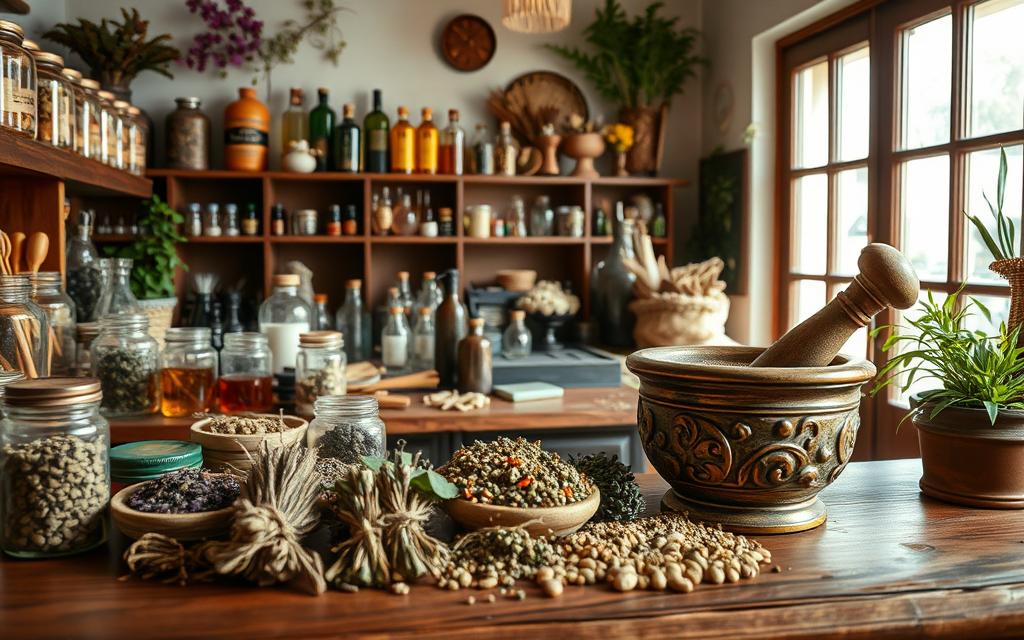
By adding these practices, we can make our wellness routine better with herbal medicine. It becomes a fun part of our daily life19.
Finding Quality Herbal Products
When we look for quality herbal products, we must focus on their safety and effectiveness. It’s important to ensure that the herbal products are standardized. This means they have consistent levels of active compounds for reliable results20. We also need to watch out for contaminants like microbes or heavy metals that can harm us21.
It’s wise to choose products that list the Latin name of the herbs. This confirms they are the right species. Herbs that meet pharmacopoeial standards are of high quality, offering the benefits we need21. Quality control is key to avoiding bad products and contaminants20.
Opting for third-party certified products, like those from the US Pharmacopeia or NSF International, is a good idea. These certifications add an extra layer of trust22. It’s also important to check how products are stored and their expiration dates to keep them effective22.
In our search for quality herbal products, we should look for brands that use advanced extraction methods. These methods help get more of the good stuff from the herbs. This way, we get potent products without extra fillers or additives20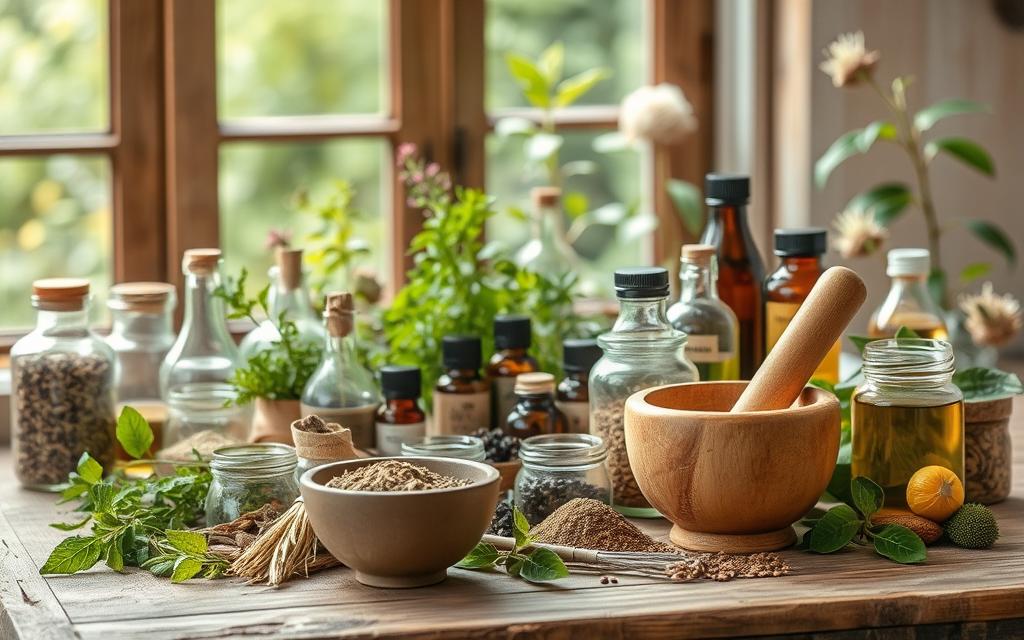
By doing our homework on the brands we choose, we can make smart choices for our health. This way, we can fully enjoy the healing power of herbal medicine.
Sustainability in Herbal Medicine
Sustainability is key in herbal medicine. Over 1,300 medicinal plant species are used in Europe, with 90% coming from wild places23. We must use herbs responsibly to avoid harming the environment. Sadly, 15,000 species are at risk of disappearing23 and24.
Using protected areas and wild nurseries helps save these plants in their homes23. Botanic gardens and seed banks also play a role in saving these plants23. This shows how we can protect and grow these vital resources.
Organic farming and Good Agricultural Practices (GAP) are crucial for sustainable herbal medicine23. They help keep the soil healthy and reduce harm to the environment23. Techniques like tissue culture and micropropagation help grow more plants while saving endangered ones23.
We need to care for nature in herbal medicine. This means using sustainable practices to avoid harming the environment24. The World Health Organization stresses the need for sustainable practices to keep medicinal plants available25. Community-based conservation, like in Ayurveda, helps us care for nature25.
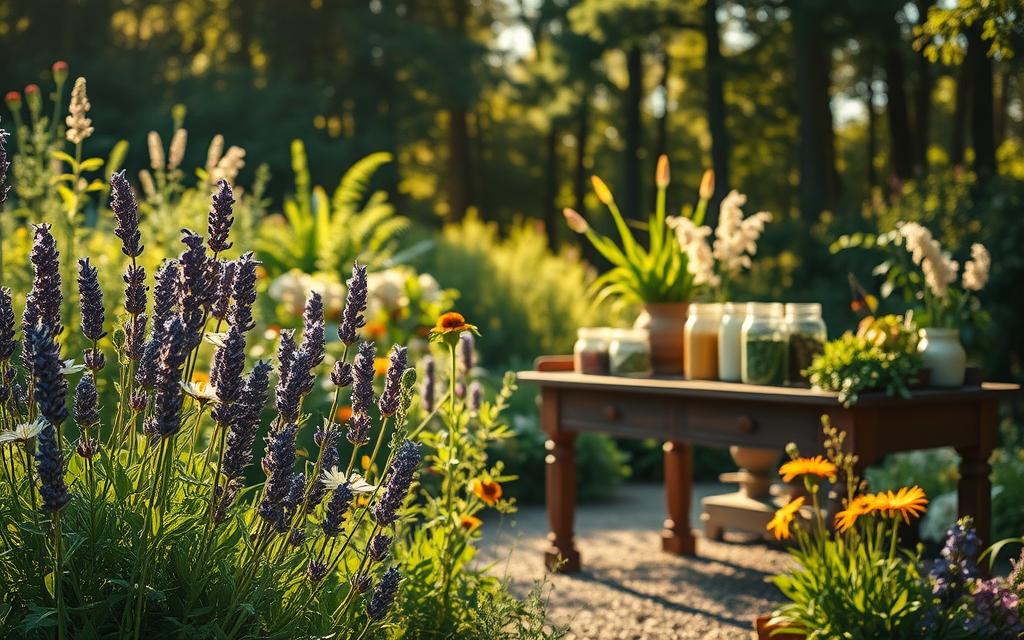
Consulting with Herbal Practitioners
Talking to qualified herbal practitioners is key for those interested in herbal medicine. They help us understand our health issues and look at our full medical history26. They work with us, helping us manage our health better26. Herbalists focus on our whole being, not just our physical health26.
They consider our lifestyle, like what we eat and how much we exercise. Then, they give us advice that fits our unique situation26. They might suggest herbal remedies like tinctures, teas, or capsules26. They also make sure these remedies won’t harm us, considering our current health and diet26.
Telling our herbalist about all our medications is important26. Even if our regular doctors don’t know much about herbal medicine, it’s good to keep them in the loop26. Getting advice from a professional is safer than using herbal products on our own26. Since herbal products aren’t FDA-approved, expert advice is crucial for their safety and effectiveness27.
Herbal products can be very different in quality, making expert advice vital for choosing good ones27. Relying only on what we find online or in stores isn’t enough; we need professional help27. Talking to a knowledgeable practitioner helps us understand if herbal supplements are right for us. They offer us the support we need as we explore alternative medicine27.
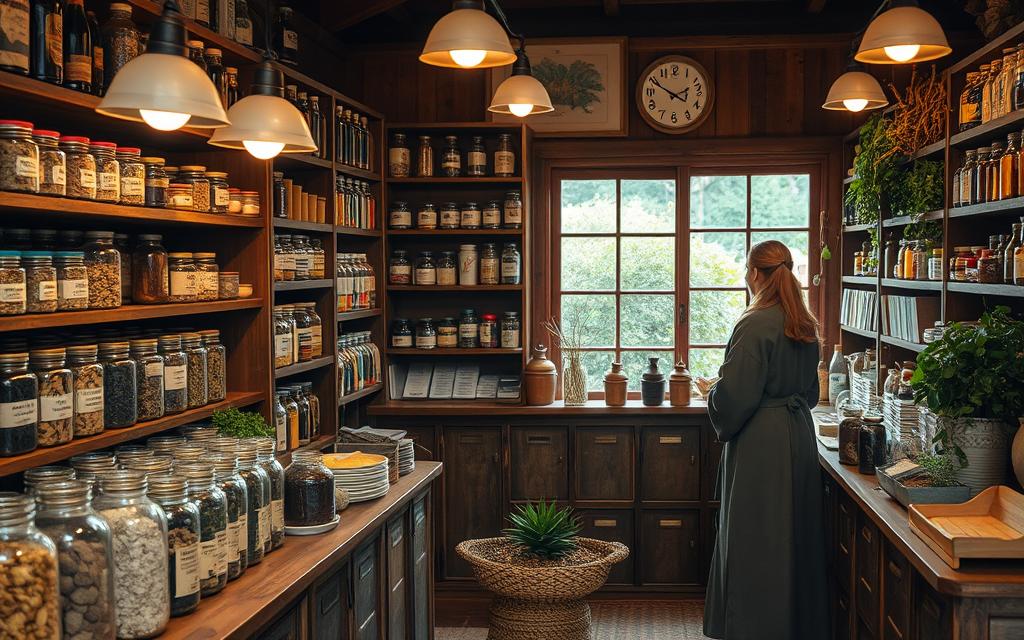
Possible Risks and Interactions of Herbal Remedies
Exploring herbal medicine, we must acknowledge the risks of herbal remedies. It’s important to know how these natural treatments can affect our health, specially when they mix with prescription drugs. The dangers of herbal remedies include direct health risks and the chance of delaying or replacing standard treatments, which can cause unexpected problems28. We need to be careful as we choose these options.
Common Interactions with Medications
Some herbal remedies can interact with common medicines, making our health concerns worse. For example, ginseng might affect medications like blood thinners, antidepressants, and cholesterol drugs29. Cat’s claw can also mess with blood thinners and blood pressure medicines. Chamomile might make oral contraceptives less effective, adding to the challenges29. This shows why we should talk to our doctor before using herbal remedies.
Side Effects to Consider
Herbal medicine also comes with potential side effects. Some herbal remedies can cause sudden toxicity symptoms, which might be clear or hidden28. When thinking about adding herbal supplements, it’s key to check the product’s quality. This can greatly impact its safety. The risk of bad reactions depends on the remedy, how much we take, and our own health, like age and genes28. Without doing our homework on herbal interactions and side effects, we risk our health.
Exploring Different Herbal Traditions
Herbal medicine traditions are diverse and shine across the globe. Each culture has its own practices and principles. For example, Traditional Chinese Medicine (TCM) uses methods like acupuncture and herbal combinations to restore energy, known as Qi30. Ayurveda, over 5,000 years old, aims for balance through diet, herbs, meditation, and yoga30.
The Gullah Geechee herbal traditions are deeply connected to community and spirituality31. They use herbs like elderflower and witch hazel for healing31. Indigenous medicine uses local plants to treat health issues, keeping a rich herbal knowledge alive30.
Understanding these traditions helps us see the value of herbal medicine. We learn about the healing power of willow bark, which led to aspirin9. This shows our respect for the knowledge passed down through generations.
Herbal Supplements: What You Should Know
Exploring herbal supplements, we must grasp their regulation and quality concerns. Unlike regular medicines, herbal supplements face less FDA oversight. This can result in products not matching their labels, possibly containing harmful substances like pesticides and heavy metals32.
Herbal supplements come with notable risks. They can interact with medications, altering their performance. For example, St. John’s Wort can change how many drugs are broken down in the body33. Also, garlic can act like a blood thinner, which is dangerous for those taking blood thinners33.
Some herbal supplements have been linked to serious health problems. Ephedra, banned in the U.S., was tied to heart issues and even death32. Black cohosh, used for menopause symptoms, might cause liver damage, but more studies are needed32.
As users of herbal medicine, safety is key. Without strict rules, makers don’t have to prove their products are safe or work before selling them32. It’s vital to do our homework, know our health, and talk to doctors before using herbal supplements.
Plant-Based Medicine and Holistic Healing
Plant-based medicine is key to holistic healing. It helps us see wellness as a whole, connecting mind, body, and spirit. This approach aims to balance and harmonize by fixing the root causes of health problems. It uses herbal medicine as a powerful treatment.
Herbal medicine helps with many health issues like allergies and mood disorders. It uses plants to heal us on many levels. Adding herbal remedies to our health plans can boost our overall well-being.
| Health Concern | Herbal Remedies |
|---|---|
| Allergies | Butterbur, Quercetin |
| Chronic Fatigue | Rhodiola, Ashwagandha |
| Mood Disorders | St. John’s Wort, Lavender |
| Insomnia | Valerian Root, Chamomile |
| Inflammation | Turmeric, Ginger |
Exploring herbal medicine shows its wide use in plant-based medicine and holistic healing. These practices lead to a healthier future.
Remember, holistic health addresses the entire person rather than just treating isolated symptoms.
Using these herbal remedies daily can greatly improve our health and happiness. Let’s use nature’s healing together3435.
Conclusion
Herbal medicine has been around for ages and is still important today. We’ve seen how nature’s remedies can help us. They are key to our health and wellness.
Many people use herbal medicine to treat illnesses. They might not like traditional treatments. The elderly often use it to stay healthy and prevent sickness.
Almost 1 in 5 adults in the U.S. use herbal products. Some, like St. John’s Wort, work as well as regular medicines. But, they can also have side effects and interact with other drugs.
Herbal medicine can’t cure all diseases. But, our personal stories and family traditions guide our choices. This makes herbal medicine special and meaningful to us.
We need more research and rules to make sure herbal products are safe and work well. By supporting science in herbal medicine, we can improve our health. This way, we can make better choices for our well-being.
FAQ
What is herbal medicine?
Herbal medicine uses plants for health. It focuses on healing the whole person by adding medicinal herbs to our routine.
How do herbal remedies differ from conventional medicine?
Herbal remedies treat the whole person, not just symptoms. They aim to fix the root cause and improve overall health.
What are some common types of herbal remedies?
Popular herbal remedies include chamomile, ginger, and echinacea. Each offers unique health benefits for our wellness journey.
Are there any risks associated with herbal remedies?
Yes, herbal remedies can have risks. They might interact with medicines or cause side effects. Always talk to a healthcare provider before using them.
How can we find quality herbal products?
Look for quality herbal products by researching companies. Check their sourcing and avoid products with fillers or additives.
What are tinctures and how are they prepared?
Tinctures are strong herbal extracts made with alcohol or vinegar. They keep the plant’s active parts for use in medicine.
How can we sustainably source herbs?
Choose herbs that are good for the environment and available. Support sustainable and ethically sourced products for holistic healing.
Why is it important to consult with herbal practitioners?
Talking to herbal practitioners is key for safe use. They give personalized advice based on your health and needs.
What role do herbal supplements play in our health?
Herbal supplements are vital in plant-based medicine. But, unlike regular medicines, they’re not strictly checked by the FDA. Always research their quality and effectiveness.
How can we incorporate herbs into our wellness routine?
Add herbs to your wellness by picking the right ones for your health goals. Use them in infusions, powders, or capsules.
Source Links
- Content – Health Encyclopedia – University of Rochester Medical Center – https://www.urmc.rochester.edu/encyclopedia/content?contenttypeid=1&contentid=1169
- Introductory Chapter: Introduction to Herbal Medicine – https://www.intechopen.com/chapters/62180
- Herbal Medicine – https://www.hopkinsmedicine.org/health/wellness-and-prevention/herbal-medicine
- Brief History Herbal Medicine – Herbal Clinic – Swansea – https://www.herbalclinic-swansea.co.uk/herbal-medicine/a-brief-history-of-herbal-medicine/
- Historical review of medicinal plants’ usage – https://pmc.ncbi.nlm.nih.gov/articles/PMC3358962/
- Herbal Medicine 101: How You Can Harness the Power of Herbs – https://www.healthline.com/health/herbal-medicine-101-harness-the-power-of-healing-herbs
- Herbal Medicine FAQs – https://americanherbalistsguild.com/resources/herbal-medicine-fundamentals/
- Live in the Classroom: Nurturing With Nature – https://cultivate.caes.uga.edu/herbs-spices-and-medicinal-plants/index.html
- Traditional medicine has a long history of contributing to conventional medicine and continues to hold promise – https://www.who.int/news-room/feature-stories/detail/traditional-medicine-has-a-long-history-of-contributing-to-conventional-medicine-and-continues-to-hold-promise
- Current state of research on the clinical benefits of herbal medicines for non-life-threatening ailments – PubMed – https://pubmed.ncbi.nlm.nih.gov/37841934/
- What Are the Benefits of Herbal Medicine? – Ledger – https://campuspress.yale.edu/ledger/what-are-the-benefits-of-herbal-medicine/
- Herbal medicine and cancer – https://www.cancerresearchuk.org/about-cancer/treatment/complementary-alternative-therapies/individual-therapies/herbal-medicine
- Herbal versus synthetic drugs; beliefs and facts – https://pmc.ncbi.nlm.nih.gov/articles/PMC5297475/
- Herbal versus Synthetic Medicines – https://www.news-medical.net/health/Herbal-versus-Synthetic-Medicines.aspx
- Herbal medicine: Types, uses, and safety – https://www.medicalnewstoday.com/articles/herbal-medicine
- 9 Popular Herbal Medicines: Benefits and Uses – https://www.healthline.com/nutrition/herbal-medicine
- Herbal Medicine: MedlinePlus – https://medlineplus.gov/herbalmedicine.html
- 5 Indispensable Herbs to Rock Your Wellness Routine | ACHS | American College of Healthcare Sciences – https://achs.edu/blog/5-herbs-to-rock-your-wellness-routine/
- 6 Ways To Incorporate Medicinal Herbs Into Your Daily Routine – https://richmondnaturalmed.com/medicinal-herbs-daily-routine/
- Advancing herbal medicine: enhancing product quality and safety through robust quality control practices – https://pmc.ncbi.nlm.nih.gov/articles/PMC10561302/
- Herbal quality and safety: What to know before you buy | Safety | Herbal Reality – https://www.herbalreality.com/herbalism/safety/herbal-quality-safety-what-know-before-you-buy/
- How To Source Quality Herbs and Supplements – CancerChoices – https://cancerchoices.org/resources/reviews-of-complementary-therapies/sourcing-quality-herbs-supplements/
- Conservation and sustainable use of medicinal plants: problems, progress, and prospects – Chinese Medicine – https://cmjournal.biomedcentral.com/articles/10.1186/s13020-016-0108-7
- Environmental sustainability of medicinal plants | Western herbal medicine | Herbal Reality – https://www.herbalreality.com/herbalism/western-herbal-medicine/environmental-sustainability-medicinal-plants/
- Herbal Medicine and Sustainable Development Challenges and Opportunities – https://link.springer.com/10.1007/978-3-031-21973-3_48-1
- Why Consult a Herbalist? – Unified Register of Herbal Practitioners – https://www.urhp.com/why_consult_herbalist.php
- Herb and supplement consultation – https://www.uchealth.org/services/herb-and-supplement-consultation/
- Health risks of herbal remedies – PubMed – https://pubmed.ncbi.nlm.nih.gov/7576267/
- Herb-Drug Interactions – https://www.nccih.nih.gov/health/providers/digest/herb-drug-interactions
- Scholar Planet Blog | Education, Science & Knowledge – https://web.gcapworld.com/blogs/view/the-healing-power-of-plants-exploring-herbal-medicine-traditions
- 4 herbal traditions used every day, all over the world – https://www.nationalgeographic.com/premium/article/herbs-traditional-medicine-everyday
- What To Do Before Taking Herbal Supplements – https://health.clevelandclinic.org/herbal-supplements-use
- Herbal Supplements – StatPearls – NCBI Bookshelf – https://www.ncbi.nlm.nih.gov/books/NBK536964/
- Herbal Medicine vs. Holistic Medicine, What’s the Difference? – Cutler Integrative Medicine – https://www.cutlerintegrativemedicine.com/blog/herbal-medicine-vs-holistic-medicine-whats-the-difference/
- Plant-Based Power: The Healing Potential of Phytotherapy – https://www.news-medical.net/drugs/Plant-Based-Power-The-Healing-Potential-of-Phytotherapy.aspx
